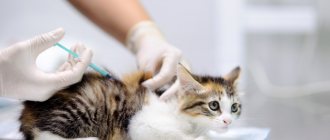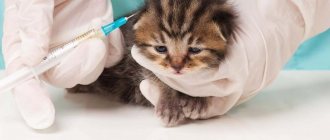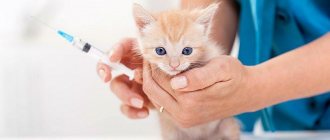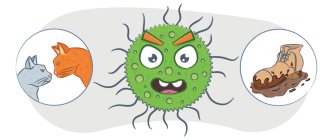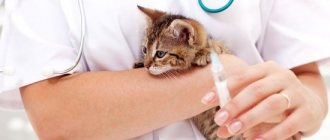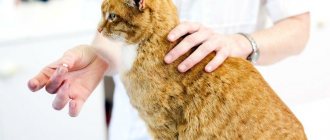Good living conditions and good nutrition are not the key to a cat’s health; the animal also needs to be prevented from diseases. One of the most effective precautions nowadays is cat vaccinations . An animal that does not leave the premises is not completely protected from disease. The infection can also be brought into the house by a person on clothes, shoes, or it can end up in water or food.
Getting vaccinated is an opportunity to protect your cat from a variety of diseases. The vaccination process itself is as follows: a small amount of the pathogen is injected into the cat’s body. As a result, the animal’s body begins to fight and develop a protective system – immunity. Vaccinations for small kittens begin at the age of 8-12 weeks , but only if the animal fed exclusively on mother's milk from the day of birth until this period. If a kitten is picked up from the street, then the first thing to do is contact our veterinarian. In order for specialists to examine the animal, since it may have diseases that require treatment. And only after recovery can the animal be vaccinated .
What vaccinations do kittens get?
Most cat owners are concerned about the question: what vaccinations should a kitten receive and whether they are mandatory.
All cat infections are extremely dangerous and are difficult for animals to tolerate. In 70% of cases, death occurs, so the baby needs to be vaccinated. Moreover, no one knows what the fate of the animal will be. Perhaps one day a pet will escape outside and come into contact with a sick representative of the fauna world.
According to the vaccination schedule, small representatives of the cat family are vaccinated against diseases that pose a serious threat to life and health.
- Leptospirosis. A dangerous infectious disease that threatens a rat-catcher or mouse-catcher, since rodents are the carriers of this infection. Owners whose pets like to walk on their own should pay attention to this disease. Basically, cats carry the infection latently (hidden), so veterinarians detect the disease at the last stage. The main signs of infection are internal and external hemorrhages (nasal/eye), fever.
- Important: Leptospirosis is transmitted to people.
- Herpesvirosis. A viral infection transmitted by airborne droplets. The disease is also popularly called rhinotracheitis. Mostly, kittens up to 7 months old suffer from herpesvirus. The disease manifests itself in the form of conjunctivitis and catarrhal lesions of the upper respiratory tract.
- Calicivirus. A disease similar to the previous one that affects young cats. It affects the respiratory organs. Symptoms include ulcers in the mouth, increased mucus in the nose, and lacrimation.
- Panleukopenia (plague). Kittens are more likely to suffer from this disease than cats. The infection is transmitted through direct contact with infected excrement or the owner's outdoor shoes that have been in plague-infected feces/soil.
Additionally, cats are vaccinated against chlamydia and leukemia if the animal is expected to participate in exhibitions, spend some time outdoors, or have contact with its feline companions.
Is it possible to inject yourself?
Experienced breeders do not recommend vaccinating themselves, especially regarding rabies. It is no secret that many pets experience a trip to a specialized clinic negatively, and an injection at home, at first glance, is an excellent solution. But in a specialized institution they will not only give the animal an injection, but also conduct a clinical examination, thermometry and make sure that the cat is healthy.
In addition, if a cat suddenly has an allergic reaction, the animal will immediately receive qualified assistance. After the injection, the veterinarian will make a note in the pet’s passport. It will include the processing date, name, series and number of the vaccine. The mark is confirmed by the signature and seal of the institution. Only such a passport will allow the animal to participate in exhibition events and freely cross the borders of the country.
Veterinary passport.
If the cat is very worried, nervous during transportation and in an unfamiliar place, you can use the service of calling a specialist to your home.
What to do if the vaccination schedule is broken
It happens that the vaccination schedule is greatly disrupted or completely unknown. This happens if a kitten was picked up on the street, but it looks like a home, which can be judged by the presence of a collar, or if the owners simply missed the moment of re-vaccination for their pet. Here you should consult your veterinarian. The doctor will tell you how best to proceed in each specific case. Sometimes a complete repeat of the kitten vaccination schedule is required, and in some situations the doctor can make an individual decision after examining the animal.
Contraindications
It is better to ask your veterinarian about contraindications to vaccination. This is what I know from the vet's mouth.
- You should not vaccinate a sick or recently ill animal. If the cat is sick, we wait until he gets better and after recovery another 2-4 weeks, depending on the diagnosis. After suffering from panleukopenia, my cat was allowed to get vaccinated a month after receiving good test results.
- You cannot vaccinate if your cat has worms or other parasites. This is why deworming is carried out. If the animal has worms, the vaccination will simply have a worse effect and immunity may not develop.
- Individual intolerance.
Types of cat vaccines
The following vaccines are most often used to vaccinate kittens:
- Nobivac Forcat. A multicomponent vaccine that stimulates immunity in kittens to calicivirus, panleukopenia, rhinotoacheitis and chlamydia;
- Nobivac Tricat. Triple action vaccine against calicivirus infection, rhinotracheitis and panleukopenia. The first vaccination for kittens is given at the age of 8 weeks. Revaccination (repeat vaccination) should be carried out annually;
- Nobivac Tricat. It also protects the little furry from the four main diseases listed. The first vaccination for a kitten can be given at the age of 12 weeks;
- Nobivac Rabies. This type of kitten vaccine only protects against rabies. The animal develops stable immunity 21 days after vaccination. Revaccination should be carried out annually. It is acceptable to mix Nobivak Rabies with other types of Nobivak vaccines;
- FORT DODGE FEL-O-VAX IV. This is a polyvalent vaccine - against several infections. Is inactivated. Protects the cat immediately from rhinotracheitis, panleukopenia, calicivirus and chlamydia. Approved for use in kittens over 8 weeks of age. Revaccination is carried out once a year;
- Purevax RCP. A multicomponent vaccine, which included strains of rhinotracheitis, panleukopenia and calicivirosis.
- Purevax RCPCh. Contains weakened strains of the viruses listed above. The vaccine is given at the age of 8 weeks. A month later they repeat. In the future, revaccination is indicated once a year.
- Leucorifelin. Protects the animal from viral viruses and panleukopenia. It is prohibited to administer Leucorifelin with other vaccines;
- Quadricate. Vaccination for kittens against panleukopenia, rabies and calicivirus. The kitten's immunity is formed in 2-3 weeks. Repeated vaccination is carried out every year;
- Rabizin. This drug is only for rabies. Unlike other types of vaccines, Rabizin can be administered even to pregnant cats;
- Leukocel 2. Vaccine against leukemia in cats. The vaccine is given twice. Then revaccination is carried out once a year. Kittens are vaccinated at the age of 9 weeks;
- Phelocel CVR. The drug stimulates the production of immunity against rhinotracheitis, panleukopenia and calicivirus. The vaccine looks like a porous mass of pale yellow color. Before use, it is diluted with a special solvent;
- Microderm. The vaccine allows you to protect the animal from dermatophytosis (lichen, etc.).
Important: it is worth remembering that young cats under 3 years of age, as well as old and weakened animals, are always at risk.
Mandatory deworming before vaccination for cats
Before vaccinations, cats need to be dewormed . Now there is a wide range of different products for deworming cats . These are tablets, drops, suspensions, pastes - in general, the range is quite large. For a kitten, the product in the form of a suspension is best suited. It is also important to remember that animals that have worms may experience side effects. This may include diarrhea, vomiting, and a lack of appetite. Therefore, when carrying out prevention, sanitary and hygienic standards should be observed.
Rules for deworming cats
- Only strictly according to the weight of the animal you need to purchase drugs.
- If there are several pets in the house, then everyone should be given the drug.
- Preventive deworming actions should be carried out regularly, every 3 or 4 months. And if the animal eats raw meat, then more often.
- If the cat is infected, then the drug must be given again after 2 weeks.
- Only after 2 weeks can vaccination be carried out.
Possible complications after vaccination in a kitten
Each animal's body reacts differently to the vaccine. Some pets may develop the following side effects:
- apathy and loss of appetite;
- refusal of water and even your favorite food;
- increased drowsiness;
- swelling and induration at the injection site;
- increased body temperature;
- convulsive conditions;
- pleurisy and encephalitis;
- pain at the injection site;
- change in fur color at the injection site and even hair loss;
- some changes in behavior.
Important: in very rare cases, a kitten’s body does not develop immunity to infections and viruses even after vaccination, but this is an individual characteristic of the animal.
As a rule, all non-dangerous side effects go away on their own within 1-4 days after vaccination or require symptomatic treatment. For example, allergic reactions are eliminated with antihistamines. In any case, if side effects occur, you should consult your doctor for advice.
How to vaccinate a cat yourself
Before administering the vaccine, you must read the instructions. The instructions indicate how a particular vaccine is administered.
I always vaccinate my cat with the same vaccine - Nobivac Tricat and Rabies. The first vaccine is against three infections, the second is against rabies. You can choose any vaccine, including domestic ones, but in any case, read the instructions before use.
Nobivak is intended for subcutaneous administration. Subcutaneous injections are given to cats at the withers. The rabies vaccine can be injected into either the withers or the muscle.
So, let's consider both introduction options.
Prepare in advance:
- cotton wool or cotton pads;
- sterile syringes no more than 2 cubes, it is possible and even better to use an even smaller size, you can purchase insulin syringes, for an injection in the withers this is even more sufficient and the needle is thinner;
- in fact, the vaccine and the solvent for it, if available and necessary;
- antihistamines just in case (in case of allergies) - at a minimum, Suprastin should be in the first aid kit.
At the withers
Try not to scare your cat before vaccination. Prepare everything in advance and only then take the animal in your hands.
We draw the drug into the syringe. If your vaccine has two fractions - the vaccine itself and the solvent, then first use a sterile syringe to inject the solvent into the vial with the vaccine. Shake well until completely dissolved.
We take the pet and moisten the injection site with alcohol. We hold the cat confidently, but do not cause pain or discomfort. We try not to make the pet nervous. It is better if two people take part - one holds, the second gives the injection.
The cat must sit on all four legs. We take the pet by the withers and slightly pull it up - in this case, with tension, a notch is formed, and we inject the injection there. Confidently, with a fairly quick movement, we insert the needle under the skin. It should not be inserted vertically inward, but parallel to the pet’s body. The depth of administration is approximately 1.5 cm. The drug should be administered at an average speed, not sharply, but not slowly. Now carefully remove the needle and release the pet.
Even a beginner can give an injection into the withers, since it is difficult to make a mistake - there are no large blood vessels and nerves in the withers, so the vaccine will get to the right place in any case.
The only thing that can happen is that with a sudden movement you can pierce the skin right through, “right through.” And one more thing - buy high-quality syringes. A needle that is too thin may break or bend.
Into the muscle
The cat's position is on its side. You need to feel the muscle in the lower part of the thigh. It is better to keep the paw in an extended position. The vaccine is administered vertically, perpendicularly. You also need to enter confidently, without making unnecessary movements. After administration, you need to stretch the muscle a little and release the animal.
The main mistakes when giving an injection into a muscle are that you can get into a blood vessel. Then you will see the blood flowing. And there is a small chance of damaging the sciatic nerve. To avoid these mistakes, do not insert the needle completely - inserting half or a little deeper is enough. And insert it into the tightest part of the muscle.
Kitten vaccination rules
In order for the kitten to be vaccinated correctly, you should follow the recommendations.
- Vaccination is not given to kittens younger than 8 weeks.
- Only a completely healthy animal without obvious signs of illness is vaccinated, and it is forbidden to vaccinate a cat if there is a suspicion that it has been in contact with a sick animal. The best solution would be to wait a couple of weeks.
- Before administering the vaccination, the veterinarian must assess the baby’s health status according to several criteria - body temperature, vigor, condition of mucous membranes.
- It is forbidden to vaccinate a kitten for three weeks after surgery and for two to three weeks before surgery.
- You should not send your pet for vaccination after antibiotic treatment. The baby’s body is weakened and even microstrains of the pathogen can provoke serious consequences. After antibiotic therapy, it is better to wait a month.
- Before vaccination, three weeks before the procedure, the animal must be dewormed.
- It is forbidden to vaccinate a cat during the period of teeth change.
- The kitten should be in a relatively calm state during vaccination. Stress and tearing out of your hands are unacceptable.
- Keep an eye on the expiration date of the vaccine if you buy it at a veterinary pharmacy. An expired drug will not benefit your pet.
Rules for vaccination and revaccination
Preparation for immunization consists of the following steps:
- 10-12 days before vaccination, preventive deworming is carried out. This must be done because worms distract the immune system from fighting them and prevent them from focusing on producing antibodies. Any anthelmintic is a poison that affects a cat to a lesser extent than parasitic worms. There is no need to expel worms before the second vaccination, since preventive deworming is carried out quarterly.
- Fleas should be eliminated with an interval of 5-7 days between treatments. Kittens should not use medications recommended for adults, such as Stronghold or Advantage drops. Therefore, arthropods should be expelled using anti-flea shampoos, which are approved for use in pets up to 8 weeks.
- Although vaccination regulations do not require fasting, it is best to keep the stomach empty to avoid stress-related vomiting.
Where is it better to vaccinate a kitten - at home or in a clinic?
Each cat owner forms the answer to this question for himself due to his financial solvency - some can afford to invite a veterinarian to their home, while others find it easier to take their pet to the clinic. But in any case, the vaccine should only be administered by a qualified doctor.
Advantages of vaccinating a kitten at home:
- you do not transport the animal to the hospital, and as a result, the kitten remains calm at the time of the doctor’s visit;
- the veterinarian has the opportunity to assess the true condition of the pet in its usual environment. When visiting the clinic, the kitten often becomes nervous, anxious, and screams, which interferes with the doctor’s normal work;
- the cat does not have contact with the street and other furry visitors to the veterinary clinic. Due to this, the risk of contracting an infection is significantly reduced;
- you don't waste time going to the hospital.
Advantages of vaccination in the clinic:
- the doctor has at hand all the necessary equipment and tools for a high-quality examination of the animal and vaccination;
- the vaccine is constantly refrigerated before its use, as required by the rules for using the drug. The fact is that the vaccine must be stored and transported only in cold conditions. In case of a home visit, the doctor must bring the drug in a special portable refrigerator;
- if necessary, in a clinic setting, you can immediately carry out any other necessary manipulations, without waiting to visit the hospital. For example, a veterinarian may identify a tick or other problems in a kitten that require immediate attention.
And remember that the veterinarian is the first friend and comrade for your pet after you. He knows exactly how to help a kitten survive the terrible moment of vaccination. For a child, vaccination is stressful, but for an experienced doctor it is a standard procedure, so trust your pet in the hands of a professional and constantly take care of his health. Only in such conditions will the kitten grow up healthy and live a long, happy life, giving you many bright moments!
Vaccinations for cats, vaccination schedule
Small kittens need vaccination only after 10-12 weeks after birth. Because during this period they feed on their mother’s milk and are under strong protection. Antibodies contained in breast milk protect against many diseases. But when animals grow up, this protection becomes insufficient. Then vaccinations for cats are mandatory. There is a special vaccination scheme for cats, following which the specialists of our veterinary center vaccinate the pet in accordance with the age and type of vaccine. The required amount of the pathogen is introduced into the cat's body. The body begins to produce antibodies, resulting in a protective reaction. Subsequently, the cat gains immunity from a particular disease. Therefore, to the question “ Do domestic cats need to be vaccinated?” "We give a positive answer.
What vaccinations do cats get?
What vaccinations does a cat need? The first vaccinations given to animals are those that prevent dangerous diseases. These include calicivirus, infectious rhinotracheitis, and feline distemper. Such diseases pose a danger to small kittens, adult cats under 3 years of age, animals with weakened immune systems or old ones.
Following the vaccination schedule , the next injections are rabies vaccinations. This viral disease is dangerous and can be transmitted to humans. Your cat should be vaccinated against rabies first. In addition, rabies can cause the death of an animal.
The next vaccination for cats is against lichen. It produces the body's defense against this skin disease and against fungal diseases. In rare cases, cat fungus can spread to an adult. However, children can be infected. Even a cat that has recovered has this disease for 5 years.
A domestic cat that does not visit the yard and does not come into contact with other animals can become infected with this disease through a person who brings the fungus on clothes or shoes.
You should also know that “YA-VET” cats need to be vaccinated annually. Because such injections are only valid for a year.
Our veterinary center specialists vaccinate cats and dogs at home. The cost of vaccinations for cats is quite reasonable. This happens due to the fact that we order drugs from direct suppliers. Therefore, the price for vaccination is reasonable. Our specialists know what vaccinations cats need. All vaccines are of high quality and contain several components.
Why do they do it?
Vaccinations for cats are mandatory and those that are given at the request of the owner. There are vaccines against the following diseases:
- Rabies is a serious disease that is fatal. A sick animal becomes aggressive or depressed, loses appetite, hydrophobia, salivation, and vomiting appear. The disease is caused by a virus that is in saliva and is transmitted during a bite. The danger is that a rabid cat will die, but may still have time to infect a person.
- Distemper (panleukopenia) is a contagious disease that mainly affects kittens; it is fatal to them. Transmitted through feces, saliva, urine, causing severe abdominal pain, vomiting, loss of appetite, and elevated body temperature. That is, the gastrointestinal tract suffers from plague.
- Calcivirosis is an infectious disease that is contagious among pets and is spread due to the use of shared trays, food bowls and water. Has a high mortality rate. Signs: high body temperature, lacrimation, ulcers in the mouth and nose, conjunctivitis.
- Rhinotracheitis (also called feline herpes) is a contagious disease, caused by a virus, affecting the mucous membranes of the eyes, mouth, nose, and signs of inflammation appear. May be fatal.
- Infectious peritonitis - the immune system suffers. The disease has not been fully studied. In purebred cats it appears before the age of one year, and in outbred cats - after 7 years.
- Leukemia is caused by a virus that penetrates the bone marrow and has a high mortality rate among those affected.
- Trichophytosis is ringworm, the disease is not fatal, but very unpleasant, there is a high probability of infecting a person.
- Chlamydia - kittens are more often affected; the gastrointestinal tract, eyes, and respiratory organs are affected.
Which ones are more necessary?
The animal must be vaccinated against the rabies virus without any excuses from the owner.
The most mandatory vaccination for cats is against rabies, because this disease is dangerous not only for animals, but also for people. However, the vaccine is often combined, in combination with other ailments. The rest can be done or not, depends on the desire of the owner. It is recommended that pets be fully vaccinated as required. Even if the cat is not allowed to go outside, a person can bring viruses or bacteria home on their shoes and the furry cat becomes infected.
